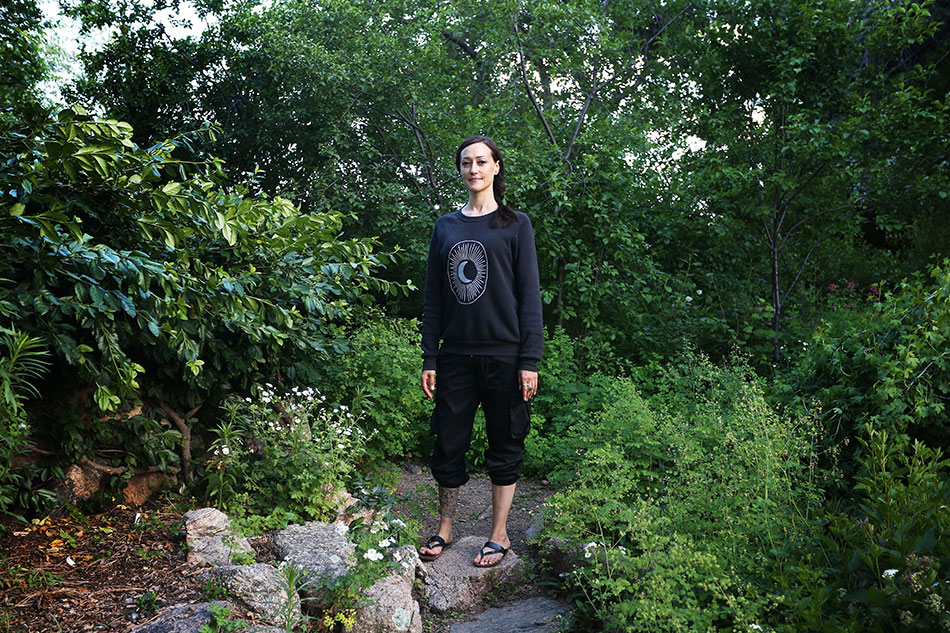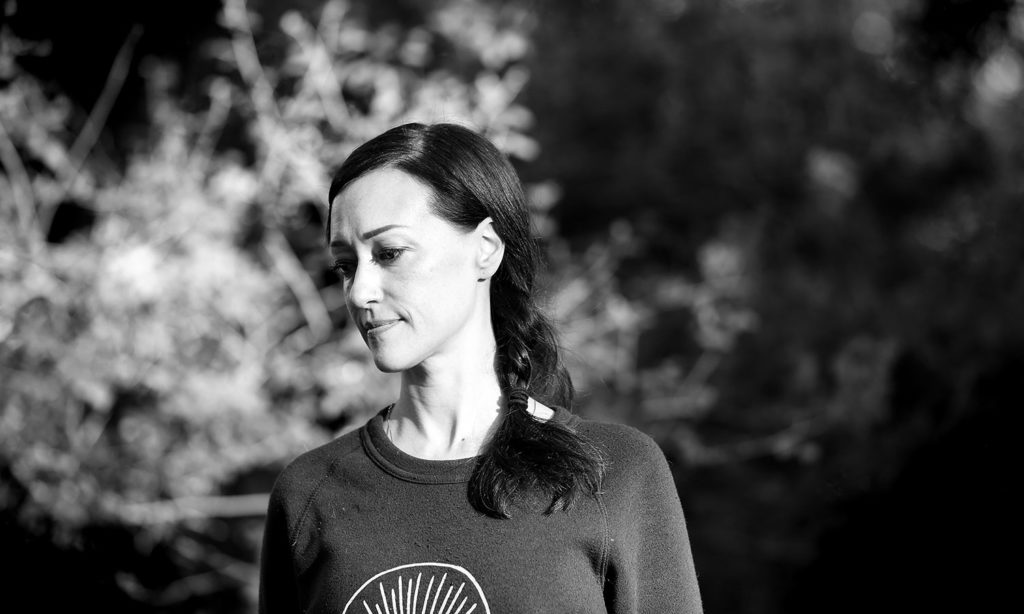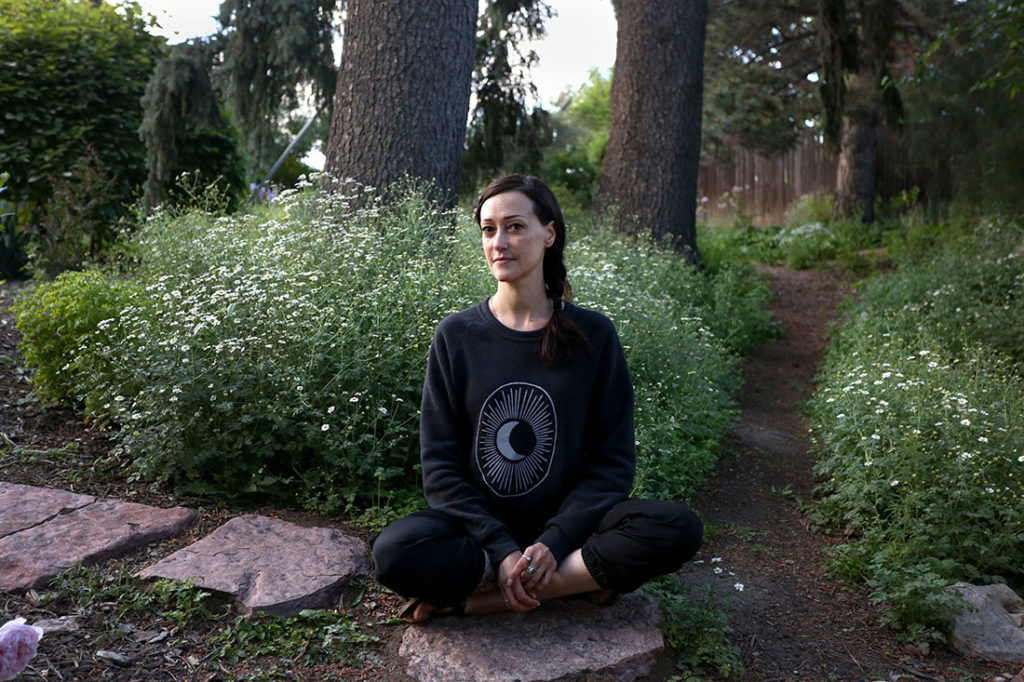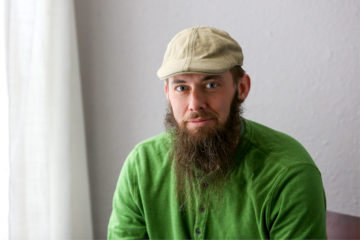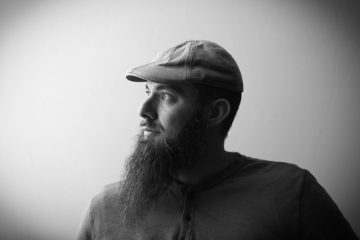Yves Sturdevant sat with me at a picnic table somewhat cocooned by nature, by a river of noise flowing on Interstate 25, and the occasional train rolling on the rails laid a stone’s throw away. There are rabbits, trees, birds, blooms. It’s one of Yves’ many happy spaces.
She shared stories and thoughts on vulnerability and joy, life and death, self-expression and the essence of being for Humanitou.
Yves is a self-described introvert, albeit one who performs with The Luddites, a dance troupe in Colorado Springs. She also is the unintentional spark of a social media experiment born of her immense curiosity.
Meet Yves Sturdevant.
Humanitou: Social media often gets used for personal, political or business agendas. You don’t use it that way. You ask questions that are light-hearted and universal, and your social media community enjoys engaging with them. Simple, social, fun. Why?
Yves: I have no idea how it started. I think it was because of what the election brought about. I was, maybe, asking questions before that, but I guess I was just randomly interested in what people thought about stuff.
I noticed how much people love to share stuff when I needed help with a gardening question. I was inundated with advice from people who never really talked to me on social media. It’s a nice break away from all the heaviness.
I’m also an introvert, so it’s a neat way for me to socialize. If I actually had to ask all those questions in a room full of people, it would be horrifying for me.
It’s a nice, comfortable, carefree way to get to know people in a way I might not in the real world. And it’s always interesting to find out what’s important to everybody.
Humanitou: Have you noticed threads or patterns in what shows up in people’s interactions with your questions?
Yves: You have a core group who will always answer. And then, depending on the question. If it’s music, you’ll get a different group of people who will answer. If it’s, “What’s your favorite donut?” then everybody answers.
After a while, I started to see what people like to respond to. One day I asked, “Who is the best person in your life? Who do you want to give a shout-out of love to right now?” And only a small handful of people responded.
Dance is so beautiful and fulfilling in a way that I don’t think I really could ever define. It’s living your essence. It’s the way that we can be, as the sunset is lovely, you know?
A couple days later I asked, “Who or what annoys you most?” Over a hundred people responded. That was kind of telling to me.
I don’t think it’s that people are necessarily negative. I think people love an opportunity to come together and share and, for whatever reason, feel way more comfortable– Because maybe we all unite in a place of annoyance.
Love seems to be a very individual and specific and intimate experience, whereas we all are annoyed by somebody in traffic, or wherever, everyday.
Humanitou: The Luddites are a belly dancing group? What’s that about for you?
Yves: I was taking many dance classes. I was enrolled full-time in all dance: hip-hop and ballet and flamenco and ballroom and modern. I had a cabaret belly dance class and a fusion American tribal-style belly dance class.
And I met them (Joy Thea, Kamara, Sandrine Graff) in belly dance classes, so it ended up that when we worked together it would be a belly dance fusion situation. We’ve been together now for seven years.
Humanitou: How did you come to dance?
Yves: I used to work at Intel, in semiconductors. We were all laid off in 2009. That was the first time in my life I had a huge severance package, so I didn’t have to worry about money for a minute. Also, they paid for me to go to school. That was part of the severance package.
So, I thought, “I’m never going to have this opportunity again. What have I always wanted to study? I have free time. I have rent money for a little bit.” I enrolled in as many dance classes as I could for two years.
Humanitou: What do you feel through that form of self-expression?
Yves: I’ve always liked to sing. When I was really little, I liked to sing in the yard. It was a self-soothing technique. My mom was a singer. That’s always been something very special to me, and I think I would use that as a way to connect to nature.
It’s like … You sit in front of an oak tree and you’re overcome with how beautiful it is and it’s not really doing anything. It’s just standing there being a tree. I feel that through singing and dancing we are being beautiful in that way, where we are our most natural and most beautiful self amongst all of nature. I think that is our place in that story of natural beauty, through our expression.
It’s all just trying to find that connection to give shape to what we feel inside as a natural being. We’re giving shape to it through our expression. So when I get to dance, it’s the best feeling.
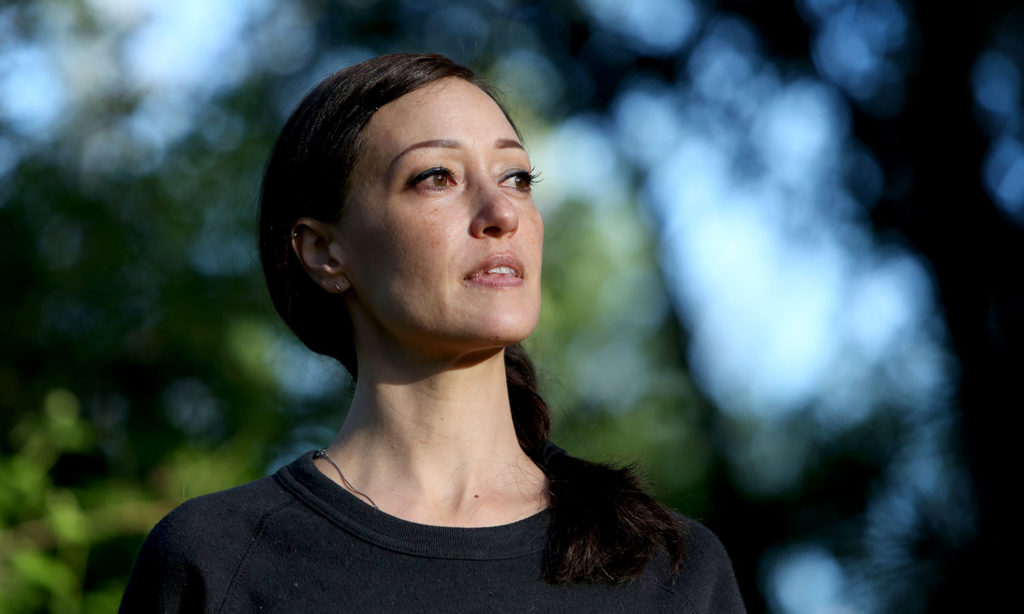
I don’t necessarily like performing, but really that’s always like three to six minutes out of months of work together. So getting to share all of that creative time with some friends, where we move and come up with movement vocabulary, and connect to whatever song we’re trying to connect to, so you get to interact with music in an interesting way and express music on your body.
That’s all so beautiful and fulfilling in a way that I don’t think I really could ever define. It’s just living your essence. I can’t think of another way to say it. It’s just the way that we can be, as the sunset is lovely, you know? A lot of times moments will hit you as beautiful and you don’t know what that reason is.
That is what we’re experiencing when we are able to give shape to our expression, whatever we might be feeling. There’s a lot of pain that may be coming out when you’re dancing, that you didn’t know and weren’t planning for. A lot of times it’s mostly joy.
There aren’t a lot of ways to express joy. There’s a ton of songs of anguish and heartbreak, but joy isn’t as equally expressed and that can really come out through throwing your energy through your whole body.
It almost feels like when you dance, you don’t have a body. Your energy is taking form and is in charge, not your body. It feels great.
Sometimes with your expression you’re searching for something. A lot of times you’re not. You’re just being, and it just feels nice to be yourself. In those spaces, you get to be your true you. You’re not fulfilling a partner role, you’re not at work, you’re not at school, you’re not a father or a brother or a husband. You’re just doing you.
Humanitou: What is a shaping experience in your life, something you recognize as a pivotal moment?
Yves: I think most recently it would be the death of my aunt. She died 11 years ago from kidney cancer. We were very, very, very close. She’s in some of my very first memories as just being this magical person to me.
She was a dancer for the Colorado Springs Ballet, and she’s just a very important person in my life. When she passed away, it happened at the same time that Intel laid us off. And I had been in that industry for 14 years. I’d just got out of an eight-year-long relationship. My grandparents passed away.
It all happened at once. It was all the sudden I wasn’t anybody’s niece. I wasn’t anyone’s granddaughter. I wasn’t this employee. I wasn’t anyone’s girlfriend. I was totally untethered. It was really, really painful.
There were times where I thought, “I can’t believe a body can survive this much pain.” It’s weird what you can survive. It felt like I should have not lived through that pain.
It’s an isolating experience when your own mother doesn’t accept you. It’s not something that everybody can understand. … Eventually I grew into understanding it wasn’t me or my fault.
I remember randomly being in a coffee shop and seeing an ad for a dance class on a bulletin board and thought, “That’s what Mary Jo, my aunt, would want me to do. She’d want me to take a dance class.” And that started me on, I’m going to enroll in as many dance classes as I can.
Through those experiences I met The Luddites, which led me to meet other people. It just reshaped my life. It’s completely different now than it was before she passed away. And it’s all because of her, that she ever was.
I think about her almost every day. It’s not in a space of pain anymore. Sometimes I think, “I wish you were here.” It’s not this wet blanket of pain on me all the time, but just random, like, the sun is hitting something really beautiful and I’ll think of her.
She wanted to live. Her last words to me were that she was going to fight it. “I want to live. I’m going to fight this,” was the last thing that she said.
That had a profound impact on me, that somebody can take up that much space in life and love life that much and give it their all, and it still be gone, still be taken away. So, where can I pick up and carry on where she didn’t get to?
That’s why I went to school. I’d never been to college, really. She didn’t get a degree, and she’d wanted to. I went ahead and finished that (in English at the University of Colorado – Colorado Springs).
Humanitou: From all that experience, that pain, I hear a story of resilience. Is there something you’ve taken away from it about your ability to survive such things and thrive? Have you reflected on that?
Yves: I don’t think I’ve ever really looked at that, because it’s something that I really wish didn’t happen. I wish I never experienced that.
I love how everything is now, but if there was a magical genie that came up and said, “You can go back and all of this would be gone,” I would probably– I don’t know. I don’t know.
I think the lesson, maybe, that was learned is that you really have to focus on what matters to you and your life.
My aunt left me these journals. There are three of these giant Tupperwares filled with journals where she was always talking about trying to do better. Trying to get a better job, trying to find a better relationship, trying to work on herself, live in a better house, take better care of herself, eat better, exercise more.
Always. It was never just, “Today, I’m happy. Today, everything’s good.” It was never that. So, I think the biggest gift I got from her leaving was to know to enjoy in my own life the things that just are, things that are just beautiful. That would be the biggest gift that I got from losing my aunt, is to know to put the brakes on always looking for more.
Forget all that, because your time, when it is going to be taken away from you, is not going to be enough. I don’t want to leave a bunch of journals filled with words of unsatisfaction. There’s plenty to be satisfied by.
Humanitou: You posted a picture on social media last month, a vintage black-and-white photograph of your mom as a teenager with her mom. The thoughts you shared with it were vulnerable, very honest. Clearly, they came from a painful experience for you. Do you mind elaborating on that story?
Yves: (My mom) was a pretty terrifying person. But she left when I was 7, so I don’t have a lot of stories of her after that. I believe mental illness played a role. It had to have. I don’t have official diagnosis for her, but I believe her to have been mentally ill.
She was extremely violent. She was horrifying. I would hide from her. I don’t want to go into creepy, horrifying details. I was there when she left, and I was relieved when she left. I felt peace. She scared me so bad.
She packed her suitcase and left, and I knew she wasn’t coming back. She didn’t say anything. She just walked out. But I knew it was safe.
I don’t have any positive memories of her. I don’t know how that is reflected in my life now, in who I am today. I don’t ever feel things and think, “That’s because of her.” All I can say is it was really terrible.
When I was little, I saw a nature program where a mama elephant was rejecting her baby calf. The narrator said something about how researchers don’t know why mother elephants reject their babies, but there was speculation that the mom can sense there is something wrong with the baby, maybe it’s sick or can’t survive.
I spent a lot of time wondering when I was a kid if I was like that baby elephant, if there was something innately wrong with me. But eventually I grew into understanding it wasn’t me or my fault.
It’s an isolating experience when your own mother doesn’t accept you. It’s not something that everybody can understand. I’ve met a lot of people who will say, “You’re not close to your mother. She gave you life. You should be grateful.” But it was horrifying.
That’s not something that a lot of people talk about. I kept thinking there might be somebody out there who has a similar story.
Humanitou: That’s why you shared the post?
Yves: Yeah. You want to know something kind of strange? I was working from home, just typing something for work, and I hit the keyboard with my hand and a random Facebook page popped up. No lie, and the group is called “Daughters of Abusive Mothers.”
Totally random. I asked to join the group and started scrolling through the stories. There’s a ton of people out there who have these experiences that are exactly what I felt like when I was a little kid.
There is value in sharing your most painful memories, in that you feel alone in them. When you find out someone else has had similar stories, it takes a little bit of the edge of that pain off. It becomes a shared experience, I guess.
Humanitou: Your experience brings up a difficult idea for many: forgiveness. Is that something you have faced or thought about?
Yves: I’ve thought about that a lot. I haven’t sat and said officially I forgive her. I also don’t sit and fester with pain. I don’t have any hate or anger when I think of her. It’s more like a resolve: OK, that happened and it sucks.
And it’s so far away now, and I hope I don’t have to experience that again. And I hope nobody I ever know or care about has to experience that kind of pain.
I have let it go. I have sat down and thought, “No more thinking about this. No more blaming yourself. No more trying to figure it out.”
There were times I tried to reach out and start a relationship with her, because I felt like that’s what you’re supposed to do. “I will find her and I will try to have a mother-daughter relationship.” She would shut it down or break it off every time.
I would think, “OK, I’m doing something wrong. I need to do something different.” At one point, I felt completely OK with just not doing that anymore and letting it go, accepting it as a resolve that this is just the way it is, and it’s all right.
It is no reflection on me, who I am, what I can be, what I can’t be. So, I have done that. I haven’t had a forgiveness ceremony, or anything like that.
I think that would be necessary if I was carrying around a lot of pain, which I don’t think I am, unless it’s buried in some secret place I haven’t found yet.
Humanitou: In general now, what do you know for sure in this life?
Yves: You know what’s funny about that? I just recently had a moment driving home from work, and thought, “I know that to be certain.” And now I have zero idea what that was. (laughs)
For sure, I know we don’t have enough time. It can go at any moment. I know that for sure, to make the best of what you’ve got.
 This Humanitou conversation is cross-posted at PeakRadar.com. PeakRadar.com is the Pikes Peak region’s cultural calendar and digital cultural center, connecting residents and tourists with our vibrant arts community. Your source for what’s happening is PeakRadar.com!
This Humanitou conversation is cross-posted at PeakRadar.com. PeakRadar.com is the Pikes Peak region’s cultural calendar and digital cultural center, connecting residents and tourists with our vibrant arts community. Your source for what’s happening is PeakRadar.com!
